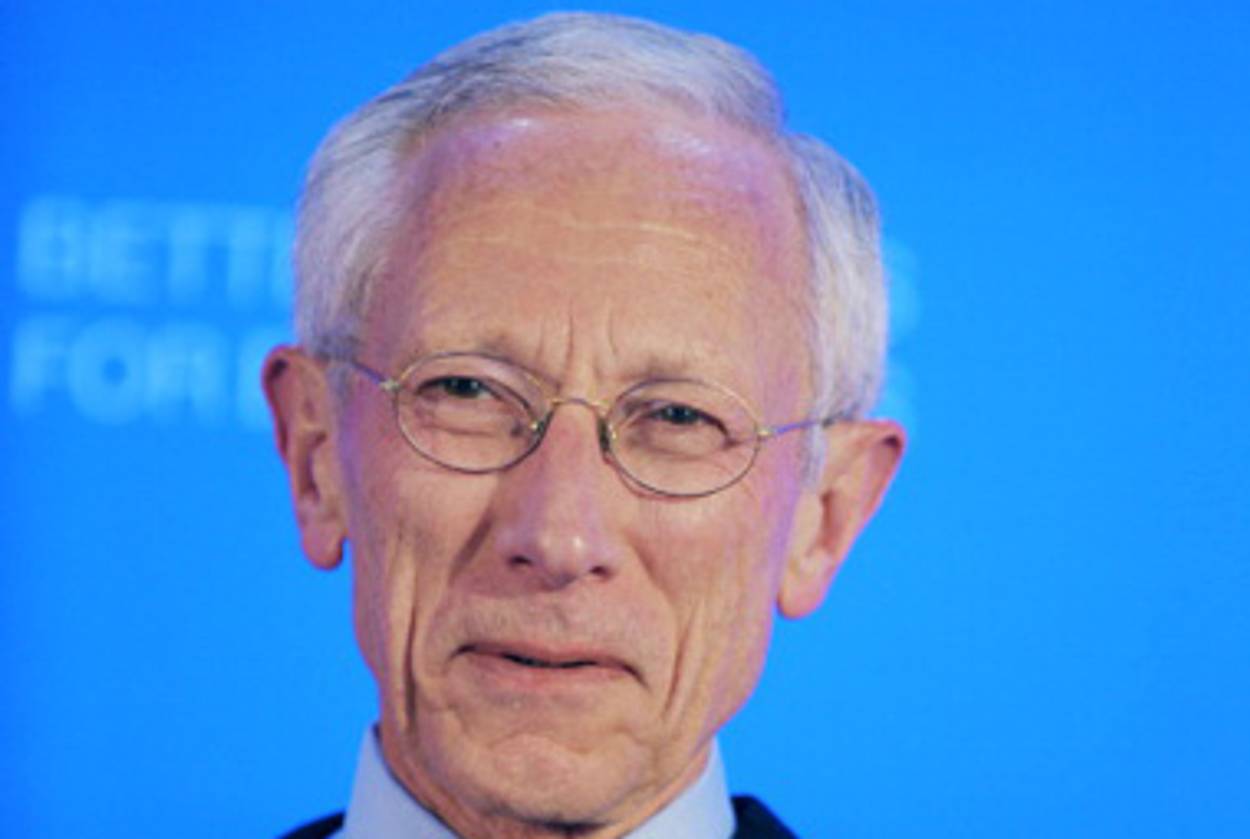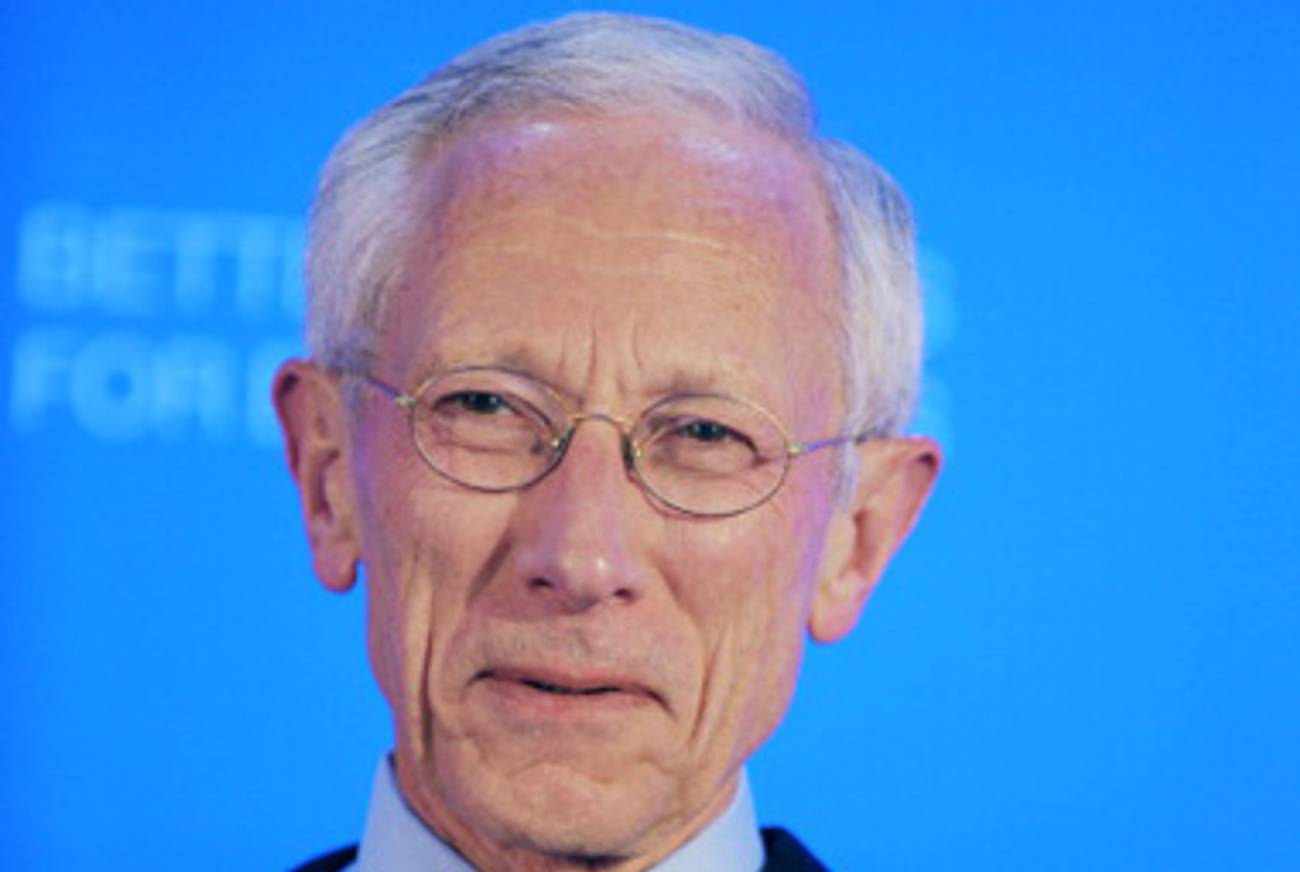Israeli Central Banker DQ’d from IMF Job
In surprise, global fund exercises age rule against Stanley Fischer




We wanted Israeli central banker Stanley Fischer to be the next head of the International Monetary Fund—previously helmed by the disgraced Dominique Strauss-Kahn—before it was cool. We’ve watched giddily as Fischer, who in the ’90s served seven years as the IMF’s number two and has performed spectacularly shepherding Israel’s economy through dire economic straits, became the favored candidate of the financial intelligentsia and as his narrow, unlikely, yet weirdly plausible path to election became clear. When he formally announced his bid last week, we were all in. One endorsement was particularly striking: Fischer is a “superb human being,” one former IMF official said, adding, “He is supremely qualified for the job. Indeed, it’s difficult to see how one can be more qualified.” The former official is Palestinian Authority prime minister Salam Fayyad.
And now the IMF has declared Fischer ineligible!
Technically, it’s correct. IMF rules stipulate that first-time, elected IMF chiefs be 65 or under; Fischer is 67. It had been widely assumed, however, that this rule would be waived if it became clear that Fischer would be the pick. The Wall Street Journal and other outlets mentioned this caveat only in passing. As Fischer himself argued, “It’s not sensible at this stage to say to someone at 67, who is full of vigor, that he’s too old.” He also said that the IMF board could vote to allow him in. That this clearly outdated rule should fell Fischer’s candidacy is borderline fishy. If anything, it was perceived to be the least of his obstacles.
He was always the unlikely next IMF head. French finance minister Christine Lagarde has secured the backing of Europe and its 35 percent of the votes. For Fischer to sneak in, Lagarde would have to be rejected by the emerging world—upset that there have been zero non-First World heads in the IMF’s 65-year history—and alternate candidate Agustín Carstens, Mexico’s top central banker, would have to fail to generate enthusiasm, thereby allowing Fischer, who though a joint U.S.-Israeli citizen was technically born in what is now Namibia, to cast himself as African and emerge as the dark-horse winner. This gambit was dealt a blow late last week when Lagarde got the support of several African nations.
On the other hand, all Fischer really needed to do was persuade elites in the United States, which holds 17 percent of the votes and is the fund’s top funder, to back him. And this task would have proved less of a chore, given that such elites as Treasury Secretary Tim Geithner have worked closely with him in the past and that other elites such as Ben Bernanke and N. Gregory Mankiw were his thesis advisees at M.I.T.
In a Wall Street Journal interview, Fischer burnished his credentials, arguing that tough times call for an actual economist to head the IMF (which Lagarde is not, though Carstens is).
There is an argument that Fischer’s ascension would be Bad for the Jews: He has been so good for Israel’s economy, and therefore losing him would, as Prime Minister Netanyahu put it, “create a problem for us.” (Bibi gave Fischer his blessing, however.) And it is not like he would be the first Jew to have the honor (um, DSK?).
But the spectacle of a brilliant, hyper-competent Israeli heading one of the leading institutions for the transfer of wealth from the First to Third World would be a great image (and it doesn’t hurt that Fischer is a longtime peacenik when it comes to the Palestinians). If there were evidence that Fischer had lost a step due to age, then of course he would not be a proper fit to head the IMF. However, as the Journal reports, he has spent the past several years as the world’s best central banker: “Fischer’s interest-rate policy is credited with helping to steer Israel’s economy nearly unscathed through the financial crisis of 2008 and overseeing strong growth,” it reported, “at a time when the U.S. and Europe are struggling.” Discounting political considerations (which is perhaps a hopelessly naïve exercise), he is clearly the best person for the job.
I really hope my call of shenanigans remains playful.
Stanley Fischer Disqulified from IMF Race Due to Old Age [Reuters/JPost]
Fischer’s 11th-Hour Entry Adds Twist to IMF Race [WSJ]
Fischer Sets Up Comparison With Lagarde [WSJ]
PM Says He Supports Fischer’s Bid to Be IMF Chief [JPost]
Palestinian PM, a Former IMF Official, Supports Israeli Central Bank Chief for IMF Job [AP/WP]
‘San Agustín’ Tries to Settle IMF’s 65-0 Score [WSJ]
Earlier: Israel’s Fischer Wouldn’t Not Accept IMF Gig
Fischer to the IMF: It Could Happen!
Who You Got on Next IMF Head?
Marc Tracy is a staff writer at The New Republic, and was previously a staff writer at Tablet. He tweets @marcatracy.